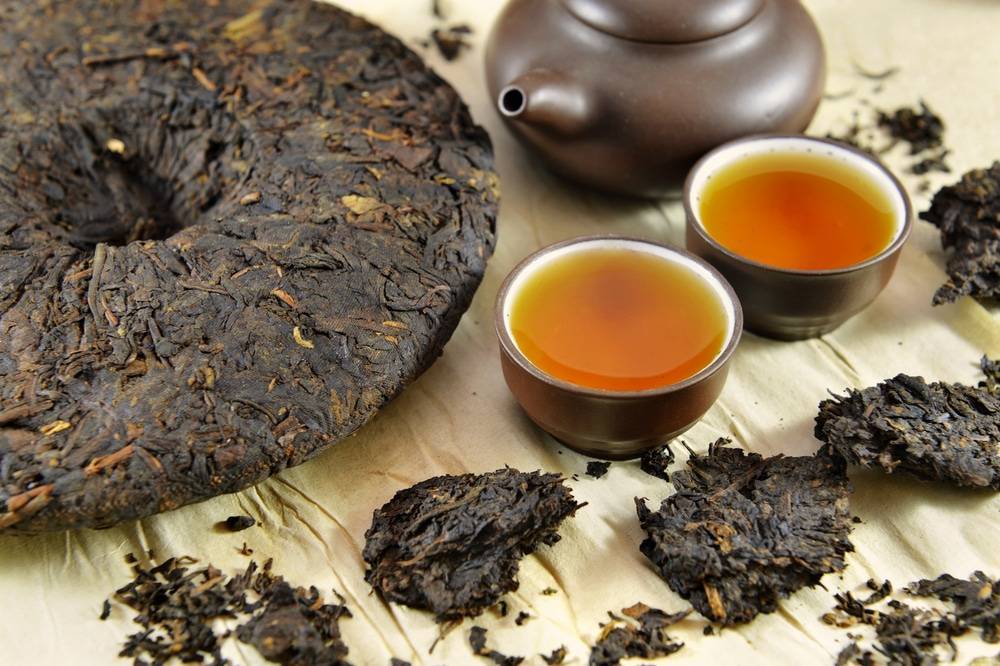From enhancing cardiovascular health to aiding metabolic processes, Pu Erh tea presents a promising natural remedy backed by scientific studies.
Pu Erh tea, originating from the Yunnan province of China, has a rich history dating back thousands of years. This fermented tea is traditionally made from the leaves of the Camellia sinensis plant, specifically the large-leaf varietal native to the region.
The unique fermentation process can last from months to years. This distinguishes Pu Erh tea with a deep, earthy flavour that evolves over time. Historically, its medicinal properties and robustness made it an ideal commodity for trading on the ancient Tea Horse Road, facilitating its spread across Asia and eventually to the West.
Today, people around the world cherish Pu Erh tea not only for its health benefits but also for its cultural significance and complex taste profile.
Cardiovascular Enhancements Through Pu Erh Tea
Pu Erh tea is celebrated for its profound impact on heart health. Particularly, in managing cholesterol levels and assisting with weight loss. In a landmark study, researchers explored the effects of Pu Erh tea on obese rats. The study revealed remarkable results: rats receiving medium (5%) and high (7.5%) doses of Pu Erh tea not only lost weight but also showed significant improvements in their cholesterol levels.
- Reduction in Serum Total Cholesterol by 26.2%: Cholesterol, a fatty substance in the blood, can build up and block blood vessels. This may lead to heart problems. A reduction of over a quarter in cholesterol levels, as observed in the study, significantly decreases the risk of heart diseases.
- Decrease in Triglycerides by 40.5%: Triglycerides are another type of fat in the blood. High levels can increase the risk of coronary artery disease. The substantial drop noted in the study points to Pu Erh tea’s potential in guarding against such conditions.
- Increase in High-Density Lipoprotein Cholesterol by 29.6%: Often referred to as ‘good cholesterol,’ HDL-C helps remove other forms of cholesterol from your bloodstream. Higher levels of HDL-C are associated with a lower risk of heart disease. The increase observed suggests that Pu Erh tea might help improve your cholesterol profile.
These findings are not just numbers. Pu Erh tea, with its unique properties, appears to offer more than just a soothing cup—it provides substantial health benefits that are both preventive and therapeutic.
Antioxidant Capacity
Pu Erh tea is renowned for its strong antioxidant properties, which play a crucial role in protecting the body from damage by harmful molecules called free radicals. These free radicals are linked to ageing, chronic diseases, and cancer. The tea’s ability to enhance the body’s own antioxidant enzymes, like superoxide dismutase (SOD) and glutathione peroxidase (GSH-Px), is particularly noteworthy.
In the same study that explored cardiovascular benefits, researchers also measured the antioxidant activity of Pu Erh tea. They found that the tea significantly:
- Increased the activity of superoxide dismutase (SOD): This enzyme is a powerful defender against oxidative stress, helping to break down potentially harmful oxygen molecules in cells, which can prevent damage to tissues.
- Boosted glutathione peroxidase (GSH-Px) levels: This enzyme plays a vital role in protecting cells from oxidative damage and helping to maintain the health and functionality of cells.
- Reduced malondialdehyde (MDA) levels: MDA is a marker of oxidative stress and cellular damage. Lower levels indicate reduced cell damage and a healthier cellular environment.
These enhancements in antioxidative enzyme activities illustrate how Pu Erh tea supports the body’s natural defence systems against oxidative stress, potentially lowering the risk of chronic diseases and contributing to overall health longevity.
Positive Alterations in Gut Microbiota
Pu Erh tea positively affects gut health by influencing the microbiome, the community of microorganisms living in the digestive tract. This aspect of health is crucial because a balanced gut microbiome supports not only digestion but also immune function and even mental health.
- Increase in Beneficial Bacteria: A study found that Pu Erh tea promotes the growth of beneficial bacteria such as Bifidobacteria and Lactobacillus. These bacteria are essential for digesting fibre, preventing infection, and maintaining a healthy immune system.
- Reduction in Harmful Bacteria: At the same time, the tea helps decrease the population of potentially harmful bacteria, which can contribute to a variety of health problems, including inflammation and gastrointestinal disorders.
By modifying the gut microbiota, Pu Erh tea not only enhances digestive health. It also contributes to broader health benefits. For example, improved immune response and potentially better mental well-being through the gut-brain axis.
Potential Roles in Cancer Prevention and Inflammation Reduction
Pu Erh tea exhibits promising anti-inflammatory and anti-cancer properties, which have been the focus of several studies. One significant aspect of Pu Erh tea’s potential in cancer treatment is its ability to induce apoptosis—the process of programmed cell death—and inhibit cell proliferation.
A pivotal study detailed the tea’s impact on human breast cancer cells:
- Induction of Apoptosis: The study found that Pu Erh tea extracts could trigger apoptosis in breast cancer cells. This is crucial because apoptosis is a way the body stops the growth of potentially harmful cells.
- Cell Cycle Arrest: Pu Erh tea extracts were observed to halt the cell cycle in cancer cells, specifically causing a build-up at a phase where the cell prepares to divide. This interruption can prevent the cells from multiplying further.
- Modulation of Cellular Signals: The tea influenced several signalling pathways involved in cell growth and survival. Notably, it increased the expression of proteins like P-p53 and p21, which are known to enhance tumour suppressor functions, and decreased the levels of proteins like PCNA and CyclinD1, which are associated with cell proliferation.
These mechanisms demonstrate the tea’s potential as an adjunctive therapy in cancer care, offering a natural method to support conventional treatments. The anti-inflammatory properties also suggest broader health benefits, such as reducing chronic inflammation, which is linked to a host of diseases, including heart disease, diabetes, and Alzheimer’s disease.
Influence on Metabolism and Insulin Sensitivity
The tea’s ability to modulate fat metabolism and enhance insulin sensitivity makes it a valuable addition to a health-conscious lifestyle.
- Enhancement of Insulin Sensitivity: Improved insulin sensitivity means that the body can more effectively use insulin to lower blood sugar levels after meals. This can help prevent spikes in blood sugar, which are linked to increased fat storage and other health issues.
- Regulation of Fat Metabolism: The tea has been found to influence the way the body metabolises fat, potentially leading to decreased fat accumulation. This is particularly important not only for weight loss, but also for maintaining healthy organ function and overall body composition.
These effects suggest that Pu Erh tea could be a supportive dietary component. Particularly for those looking to manage their weight or improve metabolic functions. Its natural properties offer a dual approach to combating obesity and metabolic syndrome.
Embracing Holistic Health
Pu Erh tea stands as a testament to the power of natural remedies in promoting holistic well-being. Backed by centuries of tradition and modern scientific research, its benefits span cardiovascular health, antioxidant capacity, gut microbiota balance, potential cancer prevention, and metabolic regulation.
As we delve deeper into its medicinal properties, Pu Erh tea offers a compelling case for inclusion in our daily routines. In embracing Pu Erh tea, we embrace a tradition steeped in both culture and science. While doing so, enriching our lives with its complex flavours and profound impact on our health.
References
- Xiong, C., Peng, Y., Liu, B., Cui, W., & Liu, X. (2019). Anti-Obesity, Anti-Atherosclerotic and Anti-Oxidant Effects of Pu-Erh Tea on a High Fat Diet-Induced Obese Rat Model. Journal of Biosciences and Medicines, 07(02), 120–130. https://doi.org/10.4236/jbm.2019.72010
- Ge, Y., Bian, X., Sun, B., Zhao, M., Ma, Y., Tang, Y., Li, N., & Wu, J. L. (2019, April 1). Dynamic Profiling of Phenolic Acids during Pu-erh Tea Fermentation Using Derivatization Liquid Chromatography–Mass Spectrometry Approach. Journal of Agricultural and Food Chemistry, 67(16), 4568–4577. https://doi.org/10.1021/acs.jafc.9b00789
- Liu, J. Y., He, D., Xing, Y. F., Zeng, W., Ren, K., Zhang, C., Lu, Y., Yang, S., Ou, S. J., Wang, Y., & Xing, X. H. (2021, August). Effects of bioactive components of Pu-erh tea on gut microbiomes and health: A review. Food Chemistry, 353, 129439. https://doi.org/10.1016/j.foodchem.2021.129439
- Xie J, Yu H, Song S, Fang C, Wang X, Bai Z, Ma X, Hao S, Zhao HY, Sheng J. Pu-erh Tea Water Extract Mediates Cell Cycle Arrest and Apoptosis in MDA-MB-231 Human Breast Cancer Cells. Front Pharmacol. 2017 Apr 6;8:190. doi: 10.3389/fphar.2017.00190. PMID: 28428754; PMCID: PMC5382226.













